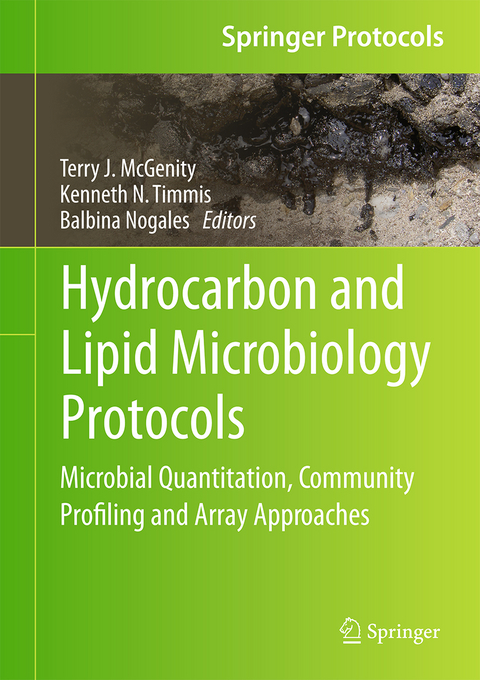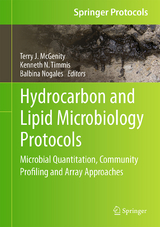Hydrocarbon and Lipid Microbiology Protocols
Springer Berlin (Verlag)
978-3-662-52776-4 (ISBN)
This Volume presents methods for quantifying microbial populations and characterising microbial communities by extracting and analysing biomarkers such as RNA, DNA and lipids. The chapters cover a wide range of topics, including: cell separation from oil-rich environments, enumeration of hydrocarbon degraders and sulphate reducers using most-probable-number techniques, and quantification by means of real-time PCR. A variety of molecular methods are described for microbial community profiling, such as phospholipid fatty acid analysis, DGGE, T-RFLP and SSCP. One chapter examines high-throughput sequencing, and provides important information on the associated procedures required for thorough data analysis. A further chapter is devoted to the characterisation of protistan communities, while the closing chapter describes multiplex fluorescent antibody microarrays for detecting microbial biomarkers.
Hydrocarbon and Lipid Microbiology Protocols
There are tens of thousands of structurally different hydrocarbons, hydrocarbon derivatives and lipids, and a wide array of these molecules are required for cells to function. The global hydrocarbon cycle, which is largely driven by microorganisms, has a major impact on our environment and climate. Microbes are responsible for cleaning up the environmental pollution caused by the exploitation of hydrocarbon reservoirs and will also be pivotal in reducing our reliance on fossil fuels by providing biofuels, plastics and industrial chemicals. Gaining an understanding of the relevant functions of the wide range of microbes that produce, consume and modify hydrocarbons and related compounds will be key to responding to these challenges. This comprehensive collection of current and emerging protocols will facilitate acquisition of this understanding and exploitation of useful activities of such microbes.
Introduction to Microbial Quantitation, Community Profiling, and Array Approaches.- A cell extraction method for oily sediments.- Introduction to microplate MPN-enumeration of hydrocarbon degraders.- Primers for dsr genes and Most Probable Number Method for detection of sulfate-reducing bacteria in oil reservoirs.- Microbial biomass and community analysis by PLFA analysis.- Real-time PCR approaches for analysis of hydrocarbon-degrading bacterial communities.- Clone libraries of ribosomal RNA gene sequences for characterization of microbial communities.- Denaturing gradient gel electrophoresis (DGGE) for microbial community analysis.- Microbial community profiling: SSCP and T-RFLP techniques.- Microbial community analysis by single-amplicon high-throughput sequencing (metagenetics) - preparation, data handling and ecological analysis.- Multiplex fluorescent antibody microarrays and antibody graphs for microbial and biomarker detection in the environment.- Studying protistan communitiesin hydrocarbon-contaminated environments.
| Erscheinungsdatum | 12.01.2017 |
|---|---|
| Reihe/Serie | Springer Protocols Handbooks |
| Zusatzinfo | X, 252 p. 30 illus., 12 illus. in color. |
| Verlagsort | Berlin |
| Sprache | englisch |
| Maße | 178 x 254 mm |
| Themenwelt | Naturwissenschaften ► Biologie ► Mikrobiologie / Immunologie |
| Technik ► Umwelttechnik / Biotechnologie | |
| Schlagworte | biochemical engineering • Biomedical and Life Sciences • Hydrocarbon-contaminated environments • Hydrocarbon-degrading bacterial communities • microbial biomass • microbial communities • Microbiology • Oily sediments |
| ISBN-10 | 3-662-52776-6 / 3662527766 |
| ISBN-13 | 978-3-662-52776-4 / 9783662527764 |
| Zustand | Neuware |
| Haben Sie eine Frage zum Produkt? |
aus dem Bereich




